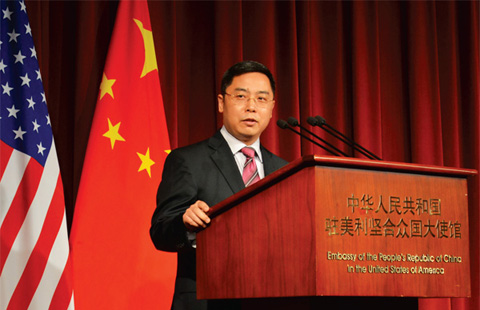The rights balance
Updated: 2015-06-05 16:58
By Oswald Chan(China Daily USA)
|
||||||||

Change takes time
HKEx Chief Executive Charles Li Xiaojia said that it will take time to formulate a market consensus on whether to accept WVR.
In April last year, Li wrote in a Hong Kong-based English-language newspaper that while investor protection, rule of law and due process are the core values of the city's equity market - "one share, one vote" is just one of the many means of achieving investor protection. "One share, one vote" should not be our core value, Li observed.
Edward Au Chun-hing, co-leader of the National Public Offering Group at Deloitte China, said:"It would be better if companies can adopt more options of corporate structures when they pursue listings in Hong Kong," he said.
Edmond Chan Chiu-kong, capital markets services co-head at PricewaterhouseCoopers (PwC) Hong Kong, told China Daily that attracting more listings by technology companies can make the city's IPO platform more diversified and further consolidate Hong Kong's position as an international capital hub.
According to the Concept Paper: "The use of WVR structures by mainland companies to list in the US market has become more common. Since 2011, the number of mainland companies listing in the US with these structures has been greater than those listing without them."
The Concept Paper also said that as at May 31 last year, 102 mainland companies were primarily listed in the US rather than in Hong Kong. Of these, 29 percent had WVR and represented 70 percent of the market capitalization of all US-listed mainland firms.
The majority of mainland firms listed in US and with WVR structures belong to the information technology sector. Companies with dual-class share structures collectively represent 14 percent of the total market capitalization of all large US-listed corporates, according to the Concept Paper.
The Concept Paper also said that there is no global trend toward or away from the WVR structure. US, Canada and Sweden permit it, while it is prohibited in Germany, Spain and the Chinese mainland for both listed and unlisted companies.
Elsewhere, unlisted companies are allowed to use such structures but those seeking primary listings are prohibited from using them. These IPO hubs include Hong Kong, Singapore, Australia and the UK.
There are no firm academic conclusions on whether companies with dual-class share structures will outperform or underperform, the Paper added.
Raphael Ding Wai-chuen, chief executive at the Hong Kong Institute of Certified Public Accountants, said: "HKEx should undertake a comprehensive review of the shareholder protection regime rather than deal with WVR in isolation. If current shareholder protection is inadequate, introducing WVR will make it even worse. It is all about protecting investors from abuse of power and underperformance by management of WVR companies."
Road to diversity
Allowing weighted voting rights with acceptable shareholder protection mechanism as the permissible corporate structure in IPOs is only one of the factors that may help diversify the city's IPO fund-raising platform, analysts from the "Big Four" accounting advisory firms told China Daily.
"Other factors such as market valuation and fulfillment of listing requirements are also key," Louis Lau Tai-cheong, partner at KPMG China's Capital Markets Group, told China Daily. "Having a larger number of technology firms list in Hong Kong will cultivate an investor base for this sector; they may be more willing to pay a premium for these companies."
Fellow KPMG partner Paul Lau Kwok-yin spoke of "other measures to capture IPO candidates amid the possibility of introduction of WVR, such as the repositioning of the Growth Enterprise Board to attract listings by smaller companies, or those at their start-up stage and lacking a profitable track record."
"HKEx may also explore ways to attract secondary listings for companies with primary listings in overseas exchanges," Paul Lau said.
Another growth driver will be the stock connect program between Hong Kong and the mainland.
"If the proposed Shenzhen-Hong Kong Stock Connect allows mainland investors to trade company shares listed in the Growth Enterprise Market, it would draw more mainland technology companies to consider listing in the city," Deloitte's Au said.
Chan at PwC said: "If the Shanghai-Hong Kong Stock Connect platform and proposed Shenzhen-Hong Kong Stock Connect can be refined to allow IPO subscription service, it would provide incentives for more companies to pursue listings in Hong Kong."
Long-term, Hong Kong should do more to consolidate the technology industry ecosystem. "By encouraging more technology investment fund managers to establish their operations in the city, more technology companies may pursue IPOs because these companies can be more extensively researched," Au said.
The Hong Kong bourse raised HK$232.5 billion from 122 new listings, up 38 percent from 2013, according to HKEx. As of December, the SAR was poised to take second place globally on fund-raising, behind New York.
Contact the writer at oswald@chinadailyhk.com

 Rescuers mourn victims on seventh day since Eastern Star disaster
Rescuers mourn victims on seventh day since Eastern Star disaster
 Rescuers enter Eastern Star hull in search efforts
Rescuers enter Eastern Star hull in search efforts
 Gaokao held across China
Gaokao held across China
 Man sues actress for staring at him
Man sues actress for staring at him
 Students prepare to take national college entrance exams
Students prepare to take national college entrance exams
 Across America (May 29- June 4)
Across America (May 29- June 4)
 Operation underway to turn the ship over
Operation underway to turn the ship over
 Prayers held for ship passengers
Prayers held for ship passengers
Most Viewed
Editor's Picks

|

|

|

|

|

|
Today's Top News
Heavyweight Zhang wins unanimous decision
China mourns Yangtze shipwreck victims as search continues
China signs $50m agreement with FAO to support developing countries
9.42 million students sit national college entrance exam
Death toll jumps to 396
as hopes of finding any
survivor in cruise fade
China, Japan reopen finance talks after delay over sour relations
Hacking claim isn't responsible, Beijing says
Startups return to China to battle pollution
US Weekly

|

|







